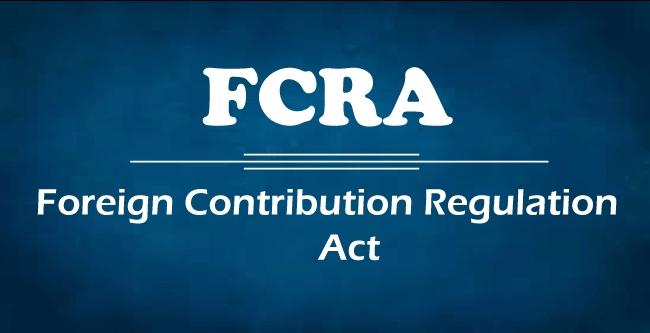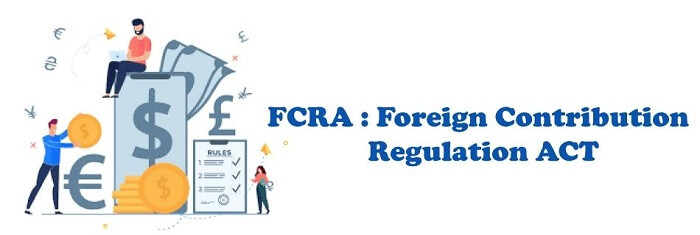What is the full form of FCRA
FCRA: Foreign Contribution (Regulation) Act
FCRA stands for Foreign Contribution (Regulation) Act. It is an act brought in 2010 that unites the governing laws and looks after the recognition and usage by specific people, associations, or businesses of the contributions made overseas and foreign hospitality. The Ministry of Home Affairs implements this act. However, registration with FCRA should be done to get foreign funds from all the Non-Governmental Organizations and Associations.

What is Foreign Contribution Regulation Act or FCRA?
To make sure that foreign funds and donations do not threaten the nation's domestic security, the Foreign Contribution Regulation Act (FCRA) is implemented. The act was first passed in 1976, revised in 2010, and then revised again in 2020. According to the act's regulation, the companies and other legal entities created in India are treated as associated branches or affiliations.
It was in March 1976 that the Foreign Contribution and Hospitality Regulation Act was passed, which further went through several amendments. This act regulated the usage of foreign contributions and hospitality by individuals and organizations while maintaining the principles of a democratic and autonomous republic. That version of the law also made sure to have secured control over the non-profit organizations and political groupings accepting foreign funds. This act was later amended in 1984 to give the mandate to all the voluntary organizations registered with the Home Ministry. This law was appealed in 2010 and replaced with a new act with strict regulation and then implemented immediately.
What is the need for Foreign Contribution Regulation Act or FCRA?
It is said that "National interest and other matters associated or incidental to it" was the primary goal when the act was brought into implementation. The Companies Act of 2013 and the Companies Rules of 2014 are used as legitimacy to the other legal provisions to interpret the clause. For NGO-related financial work, Foreign Contribution Regulation Act (FCRA) is needed.

The vision of the Foreign Contribution Regulation Act (FCRA) is to tune into a number of programs that support voluntary groups to safeguard their fundamental rights, the interest of the general public, the safety of the environment and the planet, and public health at work orientation. The need for the Foreign Contribution Regulation Act (FCRA) is for the following:-
- To keep the integrity of the country on track.
- To protect the country's sovereign rights.
- To keep the independence of election of any legislature
- To preserve and maintain better relations with the Foreign States
- To maintain peace among religion, society, regional community, and linguistic groups.
What are the features of the FCRA or Foreign Contribution Regulation Act?
The following are the features of the FCRA or Foreign Contribution Regulation Act regarding the contributions made internationally -
- Guidelines given through the FCRA or Foreign Contribution Regulation Act are to be obeyed by associations, groups, or NGOs while obtaining foreign donations or funds. They are also supposed to get register with the FCRA.
- After every five years, the registration can be renewed if all the conditions are satisfied.
- They are also needed to fill all orders or transaction details while filing the income tax return.
- Also, to give access to national security agencies, all such organizations need to hold an account in a federal or private bank providing core banking provisions.
- All political party members, media members, legislators, judges, and government employees are forbidden from accepting foreign contributions.
Recent Amendments in the Foreign Contribution Regulation Act or FCRA
The following are the significant amendments of the FCRA or Foreign Contribution Regulation Act, done in 2020:-
- The amendment prohibited the acceptance of donations from abroad by public employees.
- Also, as per the FCRA act, a person cannot donate to a foreign person, organization, or someone, who is not authorized to receive.
- The act states that all office holders, directors, key employees, or a person receiving foreign contributions are needed to have an Aadhaar number as a document of identification.
- As per the amendment to the act, foreign donations will only be accepted in the accounts of the State Bank of India's branches in New Delhi, specially designated as the FCRA accounts.
- Also, it is amended that about 20% is the maximum limit to use the foreign funds received to take over the administrative costs.
- It is also stated that under the act, a person is also allowed to renounce the certificate of registration by the central government.
Goals of the FCRA
The primary objectives of the FCRA are:
- Regulating the flow of foreign contributions to NGOs and people in India is one of the FCRA's main goals.
- Ensuring that the foreign donations are not utilized for actions that might jeopardize the nation's sovereignty or integrity but rather for lawful objectives.
- Enhancing accountability and openness in the use of foreign contributions.
- Avoiding the use of foreign cash for illicit purposes and money laundering.
- Encouraging the growth of Indian civil society groups.
Provisions of FCRA
- Registration requirements under the FCRA: Any NGO or person planning to accept contributions from abroad should register under the FCRA. Every five years, the registration needs to be renewed. The application must include a memorandum of organization, audited financial accounts, income tax returns, and other paperwork as part of the lengthy registration procedure.
- Utilization of funds: According to the FCRA, foreign contributions must only be put to use for the specific reason they were given. The way the money is used should be consistent with the NGO's or person's goals.
- Political activity is prohibited by the FCRA, which also forbids NGOs and individuals from utilizing foreign funds for any actions that can influence domestic elections.
- Conversion is not permitted, and the Act forbids the use of foreign donations in conversion. This implies that no one religion or belief should be promoted with money.
- Transparency and accountability: The FCRA requires that NGOs and individuals keep accurate records of the foreign donations they receive and use. A professional accountant should audit the records, which should then be annually reported to the government.
- Penalties for non-compliance: The FCRA sanctions fines for failure to abide by the Act's rules. The consequences include registration cancellation, asset forfeiture, and jail time.
Disputes and challenges
Many NGOs and civil society organizations have criticized the FCRA for being too restrictive and impeding their work, which has caused controversy in India. The following are some of the main issues and debates concerning the FCRA:
- Ambiguity in the concept of "political activities": Under the FCRA, organizations, and people are forbidden from utilizing foreign donations for political activities. The Act, however, does not specify precisely what counts as political activity. As a result, numerous NGOs are being accused of breaking the Act for engaging in activities they consider to be non-political, which has caused confusion and controversy.
- Limits on foreign funding: Many NGOs consider the FCRA's numerous limits on foreign donations to be overly onerous. The Act specifies that only approved banks may receive donations from abroad and forbids the use of these funds for administrative costs.
- Cancellation of registration: Under the FCRA, the government has the authority to revoke an NGO's registration if it is determined that the organization is in violation of the Act's rules. There have been claims, meanwhile, that the government has abused this clause to target NGOs that oppose its policies. On arbitrary and hazy grounds, several NGOs have had their registrations withdrawn or suspended.
- A lengthy and complicated registration procedure is required under the FCRA, and many NGOs have reported having trouble getting their applications accepted. The administration has come under fire for setting arbitrary criteria and procedures and for processing applications too slowly.
- Lack of openness in application: It has been claimed that the FCRA is not being applied in a transparent manner and that the government frequently fails to disclose sufficient information on the grounds for canceling or suspending an NGO's registration. Concerns about the Act being abused for political ends have arisen as a result of this.
Conclusion
An important piece of law that controls the flow of foreign contributions to NGOs and individuals in India is the Foreign Contribution (Regulation) Act. The Act has been criticized for being overly restrictive and impeding the functioning of NGOs and other civil society groups, even if it has helped to prevent the abuse of foreign donations for unlawful and anti-national activities. Striking a balance between fostering the expansion of civil society groups in India and maintaining openness and accountability in the use of foreign donations is necessary. The government should make efforts to simplify and increase transparency in the Act's implementation while constructively responding to NGOs' and other civil society groups' concerns. The FCRA's ultimate goal should be to advance the growth of an active civil society in India while protecting national interests.
|


 For Videos Join Our Youtube Channel: Join Now
For Videos Join Our Youtube Channel: Join Now










